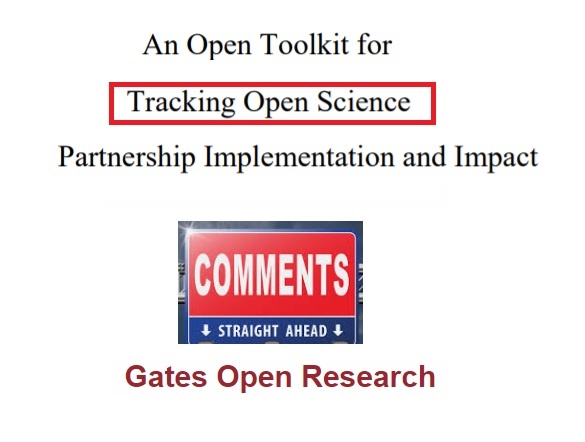The report 'An Open Toolkit for Tracking OPEN SCIENCE Partnership Implementation and Impact' : Feedback is Welcome (till the end of January 2019)
13/11/2018

|
The report 'An Open Toolkit for Tracking OPEN SCIENCE Partnership Implementation and Impact' (published on the Gates Open Research) is now available for community feedback. All input/feedback is welcome till the end of January 2019. |
Open Science (OS) ...
... comprises a set of practices, including open education, open research funding, open access publications, open data and materials, preregistration, and the avoidance of restrictive intellectual property. Nevertheless, there exists no single standard for OS with the result that different organizations, governments, and firms apply OS as a label for their own favored set of practices.
This article published on the Gates Open Platform (see also in .pdf) contributes to the OS discussion by proposing the creation of an open toolkit and data set, based on internationally developed and open measures, to provide an evidence base through which we can collectively determine if, how, when, and where partnerships based on OS principles and practices can contribute to social and economic welfare in general and research and innovation (R&I) in particular. Already, the Structural Genomics Consortium and the Montreal Neurological Institute (MNI) have agreed to use the toolkit to collect and share data.
Request for Feedback
The article present a toolkit for tracking the implementation and impact of OS partnerships. The article describes the need for and the collaborative process used to develop the toolkit, while the associated documents (*):
- Annual report, guides and survey
- Open Science measures to be considered by others
- Incomplete and rejected open science measures
- Origin of the measurement toolkit - Metadata
contain the toolkit itself.
The present toolkit will need to be translated into open source tools that, to the extent possible, collect the data automatically. Any assistance in developing these tools would be most appreciated.
Comments and suggestions on both the article and toolkit from the larger community are welcomed. Comments (relating to the comprehensiveness of proposed measures and what may be missing) from those studying, working with, or engaged in OS and OS-related projects are specifically sought.
Comments on whether the breadth of the toolkit is too ambitious to be effectively implemented and, if so, what measures should be eliminated are also welcomed.
Comments will be accepted online on GoogleDocs (*) until January 31st, 2019. After the comment period closes, the article and toolkit will be revised, taking into account proposed edits.
.jpg)
RELATED CONTENT:
- Free Open Science training courses
- FOSTER: The future of science is open
- Would you like to read more about #Openscience topics and the FOSTER activities? Find more project results and the papers we published in Zenodo community
- Why do Open Science & Incentivizing Data Sharing matter? Visit the African Open Science Platform to learn more
- The African Open Science Platform (AOSP): The Future of Science and the Science of the Future
- AAS Open Research is an opportunity for scientists in Africa to publish their research quickly and on a fully accessible platform
-
Making FAIR data a reality… and the challenges of interoperability and reusability (Simon Hodson, Executive Director, CODATA), Open Science Conference 2018, Berlin 14 March 2018
-
Open Science Conference 2019 in Berlin. Barcamp Open Science, 18 March 2019, Open Science Conference, 19-20 March 2019
The case for 'Open Science': Do we need intellectual property law?
- Want to take WIPO's General e-Course on Intellectual Property? Enroll here – it’s free of charge
- Open Science from OpenAIRE
- The Roadmap for a pan-European e-Infrastructure for Open Science in Agri-Food Sciences mentions initiatives in support of agricultural data sharing & handling
- UNESCO » GOAP » Open Science Movement
- FAO knowledge becomes Open Access
- GODAN e-learning course on Open Data Management in Agriculture and Nutrition
- Meaningful Bibliographic Metadata (M2B): Recommendations of a set of metadata properties and encoding vocabularies
.jpg)
To keep up-to-date with AIMS news, please, Sign up for AIMS News, follow @AIMS_Community on Twitter.
And, thanks again for your interest !

